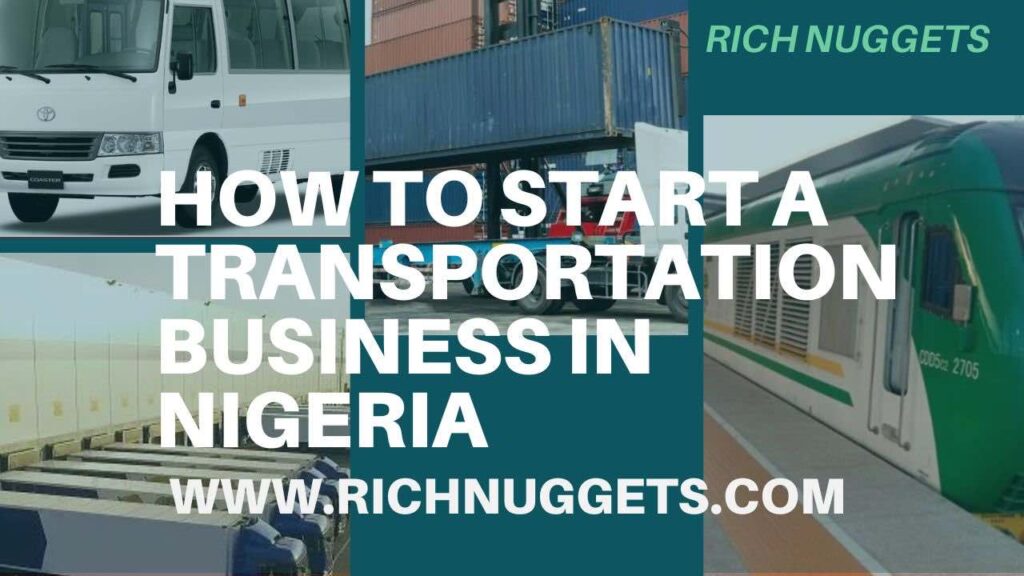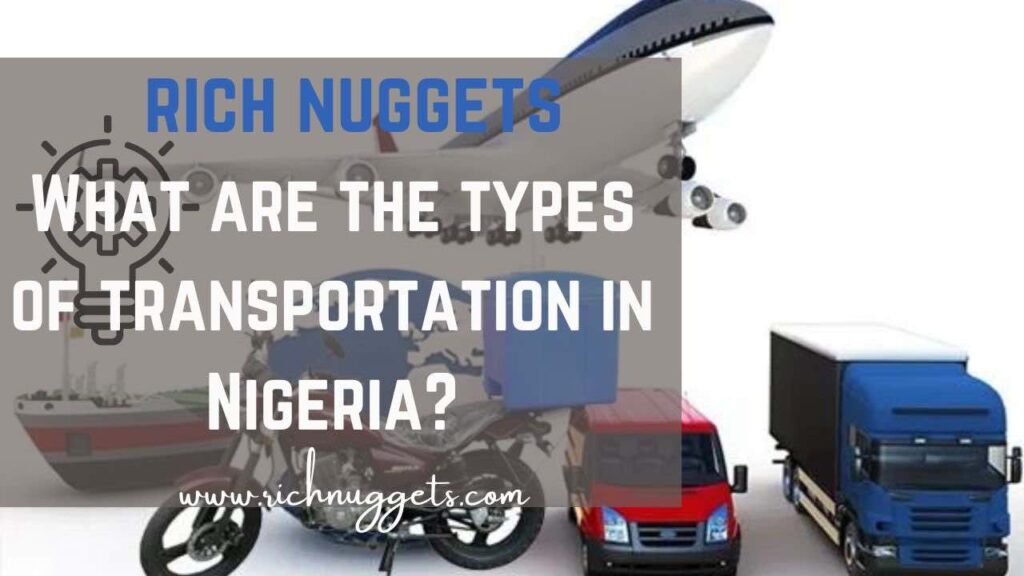
Nigeria’s transportation sector is not just a means of moving people and goods from one place to another, but a major life force that drives the heartbeat of its economy.
The industry encompasses various modes of transportation, including road, rail, air, and water transport.
The opportunities within the Nigerian transportation sector are as vast as the nation itself. These opportunities include; Developing a ride-hailing service in the urban hubs, logistics, and cargo handling, interstate and intercity transport, water transportation, and many more. Entrepreneurs are seizing the moment.
In this article, we will uncover how you too can seize an opportunity in the transportation business in Nigeria
Table of Contents
How Profitable is Transportation Business in Nigeria?

The transportation business in Nigeria is profitable if approached wisely. Although there are challenges like roads and rules, the need for good transportation creates the opportunity to make money and earn a living.
By using new technology and being smart about how your transportation business operates, especially with the transportation business that involves traveling between states by land, air, or both, you can take advantage of the country’s busy transportation system.
This can help you build a good business that contributes to economic growth and community development.
To do well in the transportation business in general, you need to plan carefully, be able to change your plans, and really know how the market works.
It might be a bit of a tough journey, but the end result is more rewarding than the challenges.
What are the types of transportation in Nigeria?

Here are the modes/types of transportation business in Nigeria:
- Road Transportation:
The backbone of Nigeria’s transportation system, road networks crisscross the country, connecting cities, towns, and villages. From congested urban roads to highways stretching across vast terrains, road transportation is the primary mode for both passengers and goods. Commuter buses, taxis, private cars, and trucks are ubiquitous on these routes. - Rail Transportation:
While rail systems have faced challenges, Nigeria is making strides to revitalize this mode of transportation. Trains offer an efficient and cost-effective means of moving people and cargo over long distances. Initiatives to upgrade existing rail lines and introduce modern services are underway by the Nigeria government, contributing to the diversification of transportation options in the country. - Air Transportation:
With a network of domestic and international airports, air travel has become an integral part of Nigeria’s transportation landscape. Airplane transportation link cities and facilitate global connectivity. Passenger flights, cargo services, and tourism contribute to the vitality of the aviation industry in Nigeria. - Water Transportation:
Nigeria’s extensive network of rivers, lakes, and coastline makes water transportation a vital mode for both trade and leisure. Ferries, boats (canoes inclusive), and barges navigate waterways, linking areas that might be inaccessible by road, especially in the south-south region and waterline areas of the country. In addition to serving as a transport option, water routes also promote tourism and cultural exchange. - Motorcycles and Tricycles:
In urban and rural areas alike, motorcycles (popularly known as “Okadas”) and tricycles (“keke Napeps”) provide flexible and efficient transportation options for short distances. While informal, these modes of transport play a significant role in local mobility.
Those are the 5 types of transportation businesses in Nigeria that contribute greatly towards the economic growth of the country.
Among the types of transportation businesses in Nigeria here are the transportation businesses that make the most money in Nigeria:
- Aviation Services
- Logistics and Cargo (Haulage) Services
- Interstate Bus Services
- Innovative Urban Mobility Solutions (i.e. Ride-sharing services)
- Water Transport and Trade
How to Start a Transportation Business in Nigeria

Here is how you can start and run a successful transportation business in Nigeria:
1. Niche Identification and Market Research
Niche identification is the first step in the right direction to be taken in the transportation business.
As you already know there are many opportunities that the transportation business in Nigeria offers to entrepreneurs, it is all left for you to decide which one aligns with your goal and capital.
The next thing to do is to conduct an extensive market research on your chosen transportation niche.
This research provides you with valuable insights into your target market behaviors, preferences, expectations, and pain points. In essence, this market research helps you understand the existing transportation landscape, competitors, and potential opportunities.
Never be discouraged if you have to change your niche or make an adjustment to your chosen transportation niche in a situation where you are faced with financial hurdles.
For instance, if your transportation niche is the interstate and intercity road transportation service; where you have to transport people from one state to another state within Nigeria and from one city to another city within a state respectively, all by roads.
But, along the course of your research, you discovered that with the level of your resources at your disposal it will be very difficult to compete with the big fishes in the industry such as; God is Good Motors (GIGM), Young Shall Grow Motors, Ifeanyi Ubah Transport Company, Peace Mass Transit, ABC Transport, Guo Motors, Rivers Link Express, and the likes.
The wise thing to do is to focus on a segment of your choosen niche, that your resources can compete favorably. –That will be the “Intercity transportation service”.
As time goes on and your business continues to grow and make name and get recommendations, you can then start to expand to other states gradually (interstate Transportation service).
2. Comprehensive Business Plan
At the heart of every successful venture lies a well-structured and meticulously crafted business plan.
This comprehensive document serves as the guiding compass, illuminating the path to achievement in the world of entrepreneurship.
It is more than just words on paper; it’s a dynamic roadmap that charts your course towards business success in the transportation business.
Your transportation business plan should include these areas;
- Business Goals
- Target Market Analysis and Competition Analysis (From your market research findings)
- Financial Projections
- Growth Strategies
- Mode of Business Operations
- Risk Management
This business plan is your business foundation for growth, strategies, innovation, and sustained success.
3. Quality Fleet and Equipment
The quality of your fleet is paramount if you want to run a transportation business Nigeria. It serves as the backbone of your operations, ensuring that your services are not only dependable but also capable of meeting the transportational needs of your customers. Investing in a well-maintained and suitable fleet is a cornerstone of success in this industry. Here is what you need to know when it comes acquiring a fleet for your transportation business in Nigeria:
1. Investing in Reliability:
A quality fleet encompasses the vehicles that form the core of your transportation services. Whether you’re running an intercity bus service, a cargo transport company, or a luxury travel experience, the reliability of your fleet is essential. These vehicles are the tangible face of your business, and their performance directly impacts customer satisfaction and safety.
2. Suitability to Chosen Niche:
Each transportation niche has unique requirements. Your vehicles must align with the specific demands of your chosen market segment. For instance, if you’re operating an intercity bus service, your fleet needs to offer comfort for longer journeys. On the other hand, if you’re focusing on cargo transport, your trucks need to be equipped to handle various types of goods securely.
3. Safety First:
Safety is non-negotiable in the transportation industry. Your fleet must adhere to strict safety standards to ensure the well-being of passengers, drivers, and cargo. Regular inspections, maintenance, and adherence to regulatory guidelines are paramount to maintaining a safe operating environment.
4. Comfort and Convenience:
For passenger-centric services, such as urban ride-sharing or tourism transport, the comfort and convenience of your fleet are critical. Clean and well-maintained vehicles, along with amenities that enhance the passenger experience, contribute to customer satisfaction and positive word-of-mouth.
5. Up-to-Date Fleets:
Keeping your fleet up-to-date is vital for remaining competitive and efficient. Modern vehicles often come with advanced technologies that improve fuel efficiency, safety features, and overall performance. Additionally, newer vehicles may align better with evolving environmental regulations.
6. Regular Maintenance:
Regular maintenance is the lifeblood of a reliable fleet. Implementing a strict maintenance schedule not only ensures the longevity of your vehicles but also minimizes the risk of unexpected breakdowns that result in fatal and nonfatal accidents. A well-maintained fleet translates into reduced downtime and increased operational efficiency.
And if you are asking; Can I start a transportation business in Nigeria with one vehicle instead of a fleet?
Yes, you can start a transportation business with one vehicle instead of a fleet except for the Aviation transportation service in Nigeria that requires three (3) airworthy aircrafts before commencing operation.
As you build and manage your fleet, remember that its quality goes hand-in-hand with the reputation and growth of your transportation business.
4. Regulatory Compliance
The first legal requirement for operating your transportation business in Nigeria is the Business Registration with the Corporate Affairs Commission (CAC).
This business registration requirement is mandatory for all kinds of transportation business that operates within Nigeria except the intracity transportation services providers such as the Okada riders, Keke Napeps, and Danfo drivers.
Apart from this business registration, there are other legal requirements that are required before you can fully operate a transportation business in Nigeria and it is dependent upon your transportation Niche.
Here is a breakdown of the legal requirements for starting each transportation business niche in Nigeria:
Road Transportation
1 Interstate and Intercity Transportation
- Vehicle License and Registration
- Driver’s License
- Vehicle Insurance
- Roadworthiness Certificate
- Insurance certificate
- Interstate Road Transport Operator’s License
- Medical Examination
- Ministry of Transport (MOT) certificate
2 Logistics and Cargo (Haulage) Transportation Services
- Vehicle License and Registration
- Driver’s License
- Vehicle Insurance
- Roadworthiness Certificate
- Insurance certificate
- Interstate Road Transport Operator’s License
- Medical Examination
- Goods Transport License
- Ministry of Transport (MOT) certificate
In a situation where you have just one vehicle and you are the driver of the vehicle, operating intercity and interstate transportation services you will need these two additional documents:
- Vehicle Lease or Ownership Documents
- Customs Clearance Documents (for imported vehicles)
3. Intracity Transportation Service
These are transportation services within the city such as Keke Napeps, Danfo Drivers, and Taxi Drivers. Here are the legal documents they must have to operate their transportation business within the city in a defined route:
- Vehicle License and Registration
- Driver’s License
- Vehicle Insurance
- Insurance certificate
- Vehicle Lease or Ownership Documents
- Customs Clearance Documents (for imported vehicles)
- Vehicle Identification Number (mandatory in some motor parks)
- Route-Specific Permits (gotten from Transport Unions)
Apart from the aforementioned legal requirement for starting a road transportation business in Nigeria, there are unions that your road transportation business must be registered with. They are:
- Road Transport Employers Association of Nigeria (RTEAN)
- National Union of Road Transport Workers (NURTW)
- National Association of Government Approved Freight Forwarders (NAGAFF)
- Nigerian Association of Road Transport Owners (NARTO)
The main objectives of these unions are to fend for their members, set transportation fare limits, and regulate competition in the industry.
Water Transportation business
- Marine Transportation Permit from the Nigerian Maritime Administration and Safety Agency (NIMASA)
- Vessel Registration
- Vessel Safety Standards
- Vessel Inspection and Certification
- Insurance Coverage
- Crew Certification and Training
Air Transportation Business
- Air Operator’s Certificate, Air Operating Permits, Air Transport License (AOC) from the Nigerian Civil Aviation Authority (NCAA)
- Aircraft Registration
- Airworthiness Certificate
- Insurance Coverage
- Crew Certification and Training
- Route Authorization Permits
- Aircraft Lease or Ownership Documents
By obtaining necessary permits, licenses, and certifications, you legitimize your business and build a strong foundation for growth. Operating within the bounds of the law not only safeguards your business from legal complications but also enhances your reputation as a responsible and trustworthy player in the transportation sector.
5. Operational Efficiency
It’s all about fine-tuning every aspect of your operations to minimize waste, enhance productivity, and ultimately boost your bottom line. Here are areas to focus on when optimizing your transportation business for efficiency:
- Efficient Route Planning
- Fuel Management
- Maintenance Schedules
- Embracing Technology (Online Booking and Payments, GPS Tracking for Real-Time Monitoring, and Efficient Routing with GPS)
- Resource Optimization
- Enhancing Customer Experience
If you can get all of the aforementioned items fully optimized you position your business for success in the Nigeria transportation business competitive landscape.
6. Financial Management
Financial management is the art of overseeing your business’s monetary aspects, tracking income, expenses, and profits, and making informed decisions to ensure that your financial resources are utilized optimally. Within the Nigerian transportation landscape, an adept financial management system is crucial for smooth operations and long-term growth.
Here is why you should implement a financial management system in your transportation business:
- For tracking revenues, expenses, and profits
- It helps your business budget wisely
- Efficient resource allocation:
- It anticipates unexpected costs by providing a contingency fund
- It helps in making informed decisions
- It enables your transportation business to easily meet its Legal and Tax obligations without complications
In addition, financial management not only safeguards your operations financially but also paves the way for strategic expansion and innovation.
7. Branding and Marketing
Your brand identity is more than just a logo or a name; it’s the essence of your business.
It encompasses the values, personality, and unique attributes that set your transportation services apart.
By crafting a brand identity that resonates with your target audience – whether it’s passengers, shippers, or travelers – you establish a connection that goes beyond transactions. A connection that puts you first in their choice of transport above others.
While, effective marketing involves a strategic blend of traditional and digital approaches to reach your target market.
Traditional methods such as; Print ads, billboards, and local partnerships can help you reach audiences who may not be digitally inclined.
On the other hand, digital marketing strategies tap into the online landscape, where a significant portion of today’s audience resides.
8. Customer Service Excellence
In the transportation business, customer service excellence is a potent ingredient that can transform ordinary experiences into memorable journeys.
This aspect of your business has the power to differentiate you from the competition and establish your brand as one that cares deeply for its customers.
Here is how your transportation business can provide excellent customer service to its customers.
- By training your staff (from high-level to least-level staff) to be able to build rapport, have a responsive attitude, and handle challenges gracefully.
- Make your transportation business be open to receive and listen to customers’ feedback
- Personalize the experience by including the names of your customers on their receipts (especially the returning customers) and addressing them by name when it is time for them to board their vehicles.
In Nigeria’s competitive market, exceptional customer service isn’t just a strategy; it’s a mindset that fuels positive word-of-mouth, repeat business, and brand loyalty.
9. Secure Finance
It’s a good idea to think about getting money from external sources because this transportation business has a bunch of challenges that could mess up your planned budget in ways you didn’t expect.
Here’s a list of ways you can get money from outside sources for your transportation business in Nigeria:
1. Bank Loans: Traditional bank loans are a common option for securing funds. You can approach banks or financial institutions to apply for a business loan, which you’ll need to repay with interest over a specified period.
- How to Get Loan From UBA Bank: Seize Your Opportunities
- Roadmap to Loan Approval: How to Get a Loan to Start a Business in 11 Steps
2. Investors and Venture Capital: Pitch your transportation business idea to angel investors or venture capital firms. In exchange for an ownership stake or equity in your business, they can provide the capital you need to grow and expand.
3. Crowdfunding: Online crowdfunding platforms allow you to raise small amounts of money from a large number of people. You can present your transportation business concept and offer incentives to those who contribute funds.
4. Microfinance Institutions: Microfinance institutions provide smaller loans tailored to the needs of small businesses and entrepreneurs. They often have less stringent requirements compared to traditional banks.
5. Grants and Subsidies: Research government grants, subsidies, and incentives available for businesses in the transportation sector. These funds are designed to promote economic growth and innovation.
6. Business Incubators and Accelerators: Joining a business incubator or accelerator program can provide not only funding but also mentorship, networking, and resources to help your transportation business thrive.
7. Peer-to-Peer Lending: Peer-to-peer lending platforms connect borrowers directly with individual lenders. This method can offer competitive interest rates and flexible terms.
8. Trade Credit: Negotiate trade credit with suppliers or vendors in the transportation industry. This allows you to delay payments for goods or services, giving you more time to generate revenue.
9. Supplier Financing: Some suppliers might offer financing options for their products or services, allowing you to acquire necessary equipment or vehicles while spreading out the payment over time.
10. Family and Friends: Personal connections can be a source of financial support. Be sure to formalize any arrangements with clear terms to avoid straining relationships.
11. Partnerships and Joint Ventures: Consider forming partnerships or joint ventures with other businesses or individuals who bring funding to the table. This can also provide access to expertise and resources.
12. Government Programs: Explore government initiatives aimed at supporting small businesses and startups. In Nigeria, agencies like SMEDAN and BOI offer funding opportunities for entrepreneurs.
- Federal Government Loans for Small Business in Nigeria
- How to Get a Loan to Start a Business from the Government
13. Private Grants and Competitions: Research private organizations or foundations that offer grants, awards, or prizes for innovative business ideas in the transportation sector.
14. Online Lending Platforms: Online lending platforms offer quick and accessible financing options for businesses. However, be cautious of interest rates and terms before proceeding.
Remember to thoroughly research and evaluate each option, considering factors such as interest rates, repayment terms, and potential impact on your business’s equity and control before you finally settle on your option.
KEY RESOURCES:
- How to pay off Debt Fast: 5 things you should never do with a Loan money
- How to Start a Business in Nigeria in 9 Easy Steps
- How to Register a Business Name in Nigeria in 7 Easy Steps
READ ALSO:
- Liquid Gold: How to Start a Pure Water Business
- How to Start a Supermarket Business in Nigeria (Supermarket Startup Secrets)
- Starting a Profitable Cold Room Business
- How to Start Logistics Business in Nigeria: A Complete Guide
Final Thoughts on Starting a Transportation Business in Nigeria
In conclusion, starting a profitable transportation business in Nigeria requires a strategic blend of vision, diligence, and careful planning.
As you navigate the dynamic market and its unique challenges, remember that every step you take is a testament to your commitment to providing exceptional services and making a meaningful impact on the Nigeria economy and society as a whole
Remember to subscribe button via Email or by turning on the Bell 🔔 notification icon, so as to get updated directly on your device when new articles are published.
Discover more from StartBizEasy
Subscribe to get the latest posts to your email.





